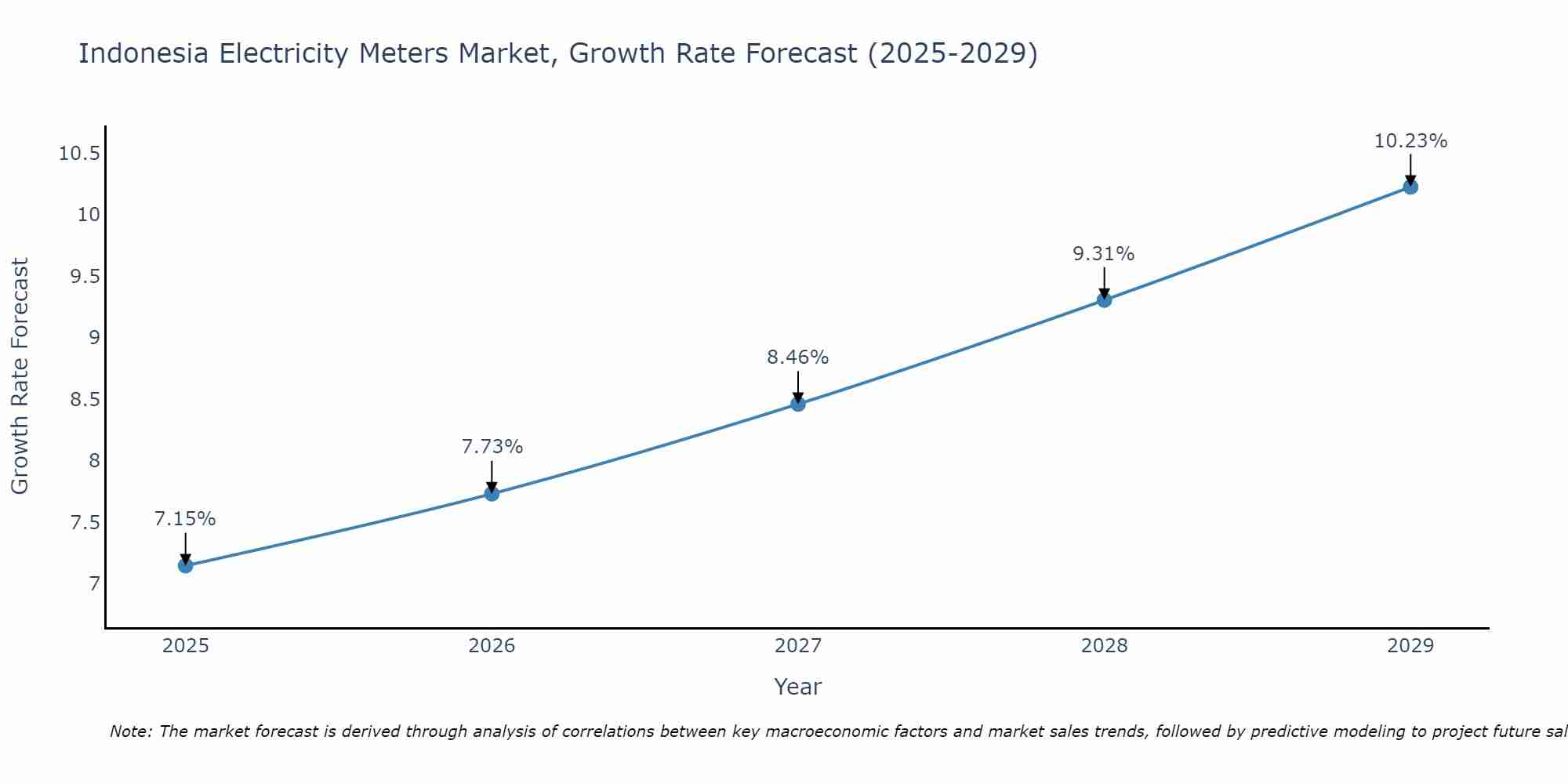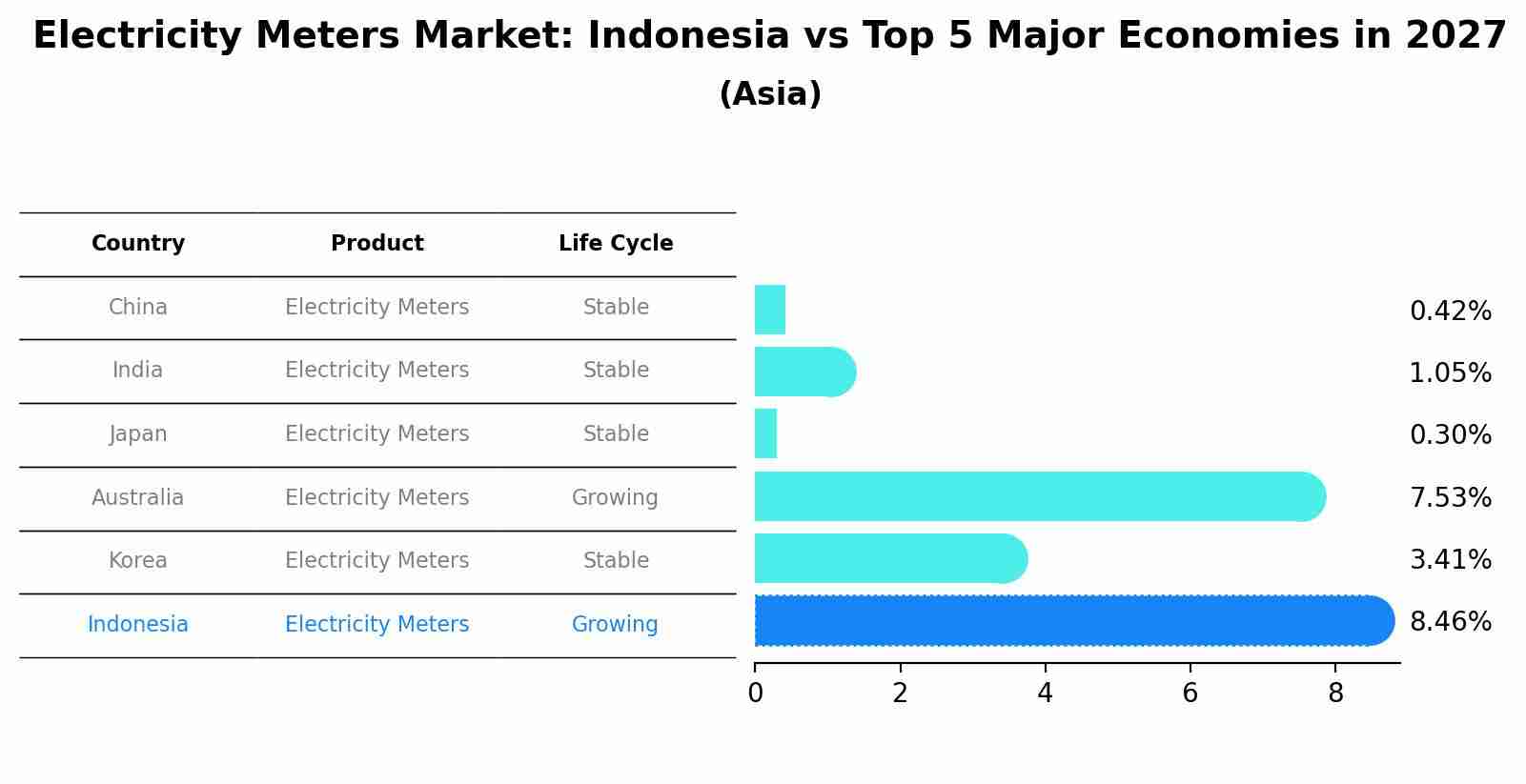Indonesia Electricity Meters Market (2025-2031) Outlook | Industry, Value, Forecast, Share, Companies, Revenue, Trends, Size, Growth & Analysis
| Product Code: ETC432924 | Publication Date: Oct 2022 | Updated Date: Apr 2025 | Product Type: Market Research Report | |
| Publisher: 6Wresearch | Author: Ravi Bhandari | No. of Pages: 75 | No. of Figures: 35 | No. of Tables: 20 |
Indonesia Electricity Meters Market Size Growth Rate
The Indonesia Electricity Meters Market is likely to experience consistent growth rate gains over the period 2025 to 2029. The growth rate starts at 7.15% in 2025 and reaches 10.23% by 2029.

Electricity Meters Market: Indonesia vs Top 5 Major Economies in 2027 (Asia)
In the Asia region, the Electricity Meters market in Indonesia is projected to expand at a growing growth rate of 8.46% by 2027. The largest economy is China, followed by India, Japan, Australia and South Korea.

Indonesia Electricity Meters Market Synopsis
The electricity meters market in Indonesia is undergoing transformation. The country is modernizing its energy infrastructure and transitioning towards smart grids and meters. This shift is driven by the need for efficient energy management, reducing losses in the distribution network, and encouraging energy conservation. Smart meters are becoming increasingly popular, offering real-time data monitoring and two-way communication between consumers and utilities. This technology is expected to play a significant role in achieving energy efficiency and sustainability goals.
Drivers of the Market
The Indonesia Electricity Meters market is influenced by several driving factors. Firstly, the country`s increasing energy consumption, driven by urbanization and industrialization, requires a robust and reliable electricity metering infrastructure. This is essential for accurate billing and efficient energy management. Secondly, government initiatives to improve energy efficiency and reduce losses in the distribution network necessitate the deployment of advanced electricity meters. Thirdly, the adoption of smart meters with remote reading and data analytics capabilities has gained traction, further driving market growth. Additionally, regulatory requirements for accurate energy billing and transparency in electricity consumption contribute to the demand for modern electricity meters.
Challenges of the Market
The electricity meters market in Indonesia encounters several challenges. One of the primary issues is the prevalence of electricity theft and meter tampering, which results in revenue losses for utility companies. This requires constant vigilance and investment in anti-tampering technology. Moreover, the rollout of smart meters faces hurdles in terms of infrastructure and connectivity in some remote areas. There is also a need for educating consumers about the benefits of smart meters to gain their acceptance.
COVID-19 Impact on the Market
The electricity meters market remained relatively stable during the pandemic, as utilities continued to provide essential services. However, disruptions in the supply chain and delayed meter installations impacted the market`s growth. With the focus on energy efficiency and smart metering, the market is likely to witness steady growth in the post-pandemic period.
Key Players in the Market
Prominent companies in the Indonesia electricity meters market, including manufacturers like PT. Hexing Indonesia, produce electricity meters used for accurate measurement of electrical consumption in residential, commercial, and industrial settings.
Key Highlights of the Report:
- Indonesia Electricity Meters Market Outlook
- Market Size of Indonesia Electricity Meters Market, 2024
- Forecast of Indonesia Electricity Meters Market, 2031
- Historical Data and Forecast of Indonesia Electricity Meters Revenues & Volume for the Period 2021-2031
- Indonesia Electricity Meters Market Trend Evolution
- Indonesia Electricity Meters Market Drivers and Challenges
- Indonesia Electricity Meters Price Trends
- Indonesia Electricity Meters Porter's Five Forces
- Indonesia Electricity Meters Industry Life Cycle
- Historical Data and Forecast of Indonesia Electricity Meters Market Revenues & Volume By Type for the Period 2021-2031
- Historical Data and Forecast of Indonesia Electricity Meters Market Revenues & Volume By Single Phase for the Period 2021-2031
- Historical Data and Forecast of Indonesia Electricity Meters Market Revenues & Volume By Three Phase for the Period 2021-2031
- Historical Data and Forecast of Indonesia Electricity Meters Market Revenues & Volume By Analog for the Period 2021-2031
- Historical Data and Forecast of Indonesia Electricity Meters Market Revenues & Volume By Smart for the Period 2021-2031
- Historical Data and Forecast of Indonesia Electricity Meters Market Revenues & Volume By Application for the Period 2021-2031
- Historical Data and Forecast of Indonesia Electricity Meters Market Revenues & Volume By Residential for the Period 2021-2031
- Historical Data and Forecast of Indonesia Electricity Meters Market Revenues & Volume By Commercial for the Period 2021-2031
- Historical Data and Forecast of Indonesia Electricity Meters Market Revenues & Volume By Industrial for the Period 2021-2031
- Historical Data and Forecast of Indonesia Electricity Meters Market Revenues & Volume By Others for the Period 2021-2031
- Indonesia Electricity Meters Import Export Trade Statistics
- Market Opportunity Assessment By Type
- Market Opportunity Assessment By Application
- Indonesia Electricity Meters Top Companies Market Share
- Indonesia Electricity Meters Competitive Benchmarking By Technical and Operational Parameters
- Indonesia Electricity Meters Company Profiles
- Indonesia Electricity Meters Key Strategic Recommendations
Frequently Asked Questions About the Market Study (FAQs):
- Single User License$ 1,995
- Department License$ 2,400
- Site License$ 3,120
- Global License$ 3,795
Search
Thought Leadership and Analyst Meet
Our Clients
Related Reports
- Afghanistan Rocking Chairs And Adirondack Chairs Market (2026-2032) | Size & Revenue, Competitive Landscape, Share, Segmentation, Industry, Value, Outlook, Analysis, Trends, Growth, Forecast, Companies
- Afghanistan Apparel Market (2026-2032) | Growth, Outlook, Industry, Segmentation, Forecast, Size, Companies, Trends, Value, Share, Analysis & Revenue
- Canada Oil and Gas Market (2026-2032) | Share, Segmentation, Value, Industry, Trends, Forecast, Analysis, Size & Revenue, Growth, Competitive Landscape, Outlook, Companies
- Germany Breakfast Food Market (2026-2032) | Industry, Share, Growth, Size, Companies, Value, Analysis, Revenue, Trends, Forecast & Outlook
- Australia Briquette Market (2025-2031) | Growth, Size, Revenue, Forecast, Analysis, Trends, Value, Share, Industry & Companies
- Vietnam System Integrator Market (2025-2031) | Size, Companies, Analysis, Industry, Value, Forecast, Growth, Trends, Revenue & Share
- ASEAN and Thailand Brain Health Supplements Market (2025-2031) | Strategy, Consumer Insights, Analysis, Investment Trends, Opportunities, Growth, Size, Share, Industry, Revenue, Segments, Value, Segmentation, Supply, Forecast, Restraints, Outlook, Competition, Drivers, Trends, Demand, Pricing Analysis, Competitive, Strategic Insights, Companies, Challenges
- ASEAN Bearings Market (2025-2031) | Strategy, Consumer Insights, Analysis, Investment Trends, Opportunities, Growth, Size, Share, Industry, Revenue, Segments, Value, Segmentation, Supply, Forecast, Restraints, Outlook, Competition, Drivers, Trends, Demand, Pricing Analysis, Competitive, Strategic Insights, Companies, Challenges
- Europe Flooring Market (2025-2031) | Outlook, Share, Industry, Trends, Forecast, Companies, Revenue, Size, Analysis, Growth & Value
- Saudi Arabia Manlift Market (2025-2031) | Outlook, Size, Growth, Trends, Companies, Industry, Revenue, Value, Share, Forecast & Analysis
Industry Events and Analyst Meet
Whitepaper
- Middle East & Africa Commercial Security Market Click here to view more.
- Middle East & Africa Fire Safety Systems & Equipment Market Click here to view more.
- GCC Drone Market Click here to view more.
- Middle East Lighting Fixture Market Click here to view more.
- GCC Physical & Perimeter Security Market Click here to view more.
6WResearch In News
- Doha a strategic location for EV manufacturing hub: IPA Qatar
- Demand for luxury TVs surging in the GCC, says Samsung
- Empowering Growth: The Thriving Journey of Bangladesh’s Cable Industry
- Demand for luxury TVs surging in the GCC, says Samsung
- Video call with a traditional healer? Once unthinkable, it’s now common in South Africa
- Intelligent Buildings To Smooth GCC’s Path To Net Zero


















